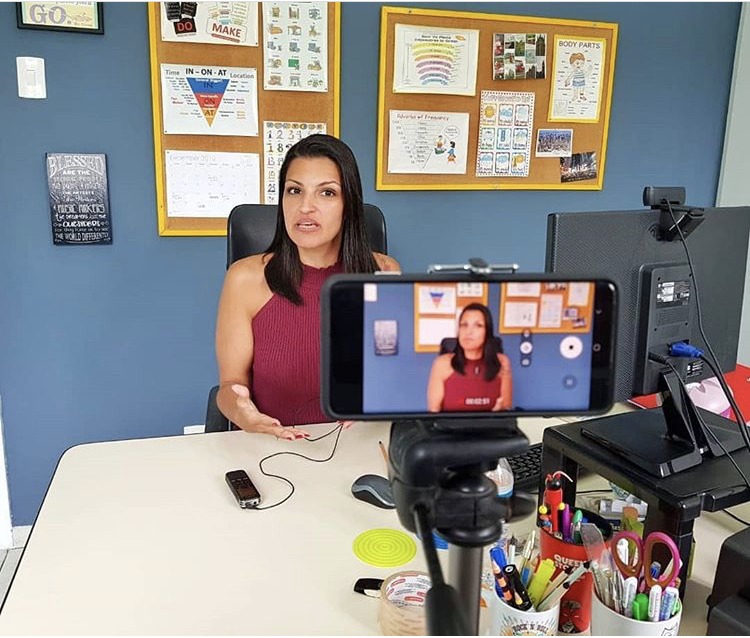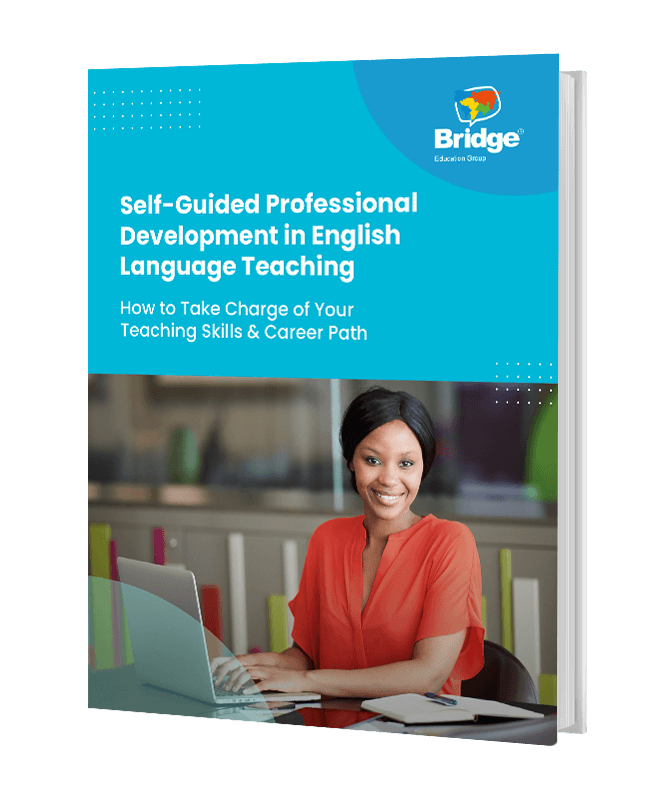The year 2025 is almost here! It’s a great time to define your goals in teaching English language learners for the new year. Whether you’re choosing New Year’s resolutions or just need to spice up your teaching routine, reflecting on your teaching practices and identifying clear goals will benefit you and your students. We’ve got 10 powerful goals for English teachers to help you ring in the new year with a bang. Use meaningful New Year’s goals to visualize your upcoming year, build a more engaging classroom, and take care of your physical and mental health.
- 1. Get certified or upgrade your existing certification to 120+ hours
- 2. Enhance your resume with professional development
- 3. Develop a teaching niche
- 4. Learn a new skill
- 5. Build better rapport with your students
- 6. Collaborate more by joining a community of teachers
- 7. Use more technology and tech tools in the classroom
- 8. Prioritize your mental health
- 9. Revisit your teaching style and/or philosophy
- 10. Branch out as an independent teacher
1. Get certified or upgrade your existing certification to 120+ hours
Let’s kick off this list of 2025 goals in teaching English language learners with an essential one: TEFL certification. If you’re not already certified, consider getting a professional TEFL/TESOL certificate this year.
A teaching certificate can grant you access to better jobs and higher pay. If you already have a certification, you can upgrade it to ensure that it contains 120+ hours of study, as 120 is the average number of credit hours that employers will want to see. Whether you plan to teach abroad or online, you can’t go wrong with online TEFL certification!

2. Enhance your resume with professional development
Professional development for ESL teachers is incredibly important if you want to stand out from other job applicants and continue improving as a teacher. Professional development can take the form of:
- Taking courses, such as short Bridge Micro-credentials, to develop new skills or stay on top of trending ESL teaching topics (more on this in #4).
- Participating in the Bridge Expert Series webinars, which cover a variety of TEFL topics and feature industry leaders. Earn a Certificate of Professional Development after watching each Expert Series webinar. Register to attend live webinars, or join our community to access a library of 80+ on-demand ELT webinars.
- Hosting a workshop at your school.
- Attending a virtual TEFL/TESOL conference.
- Connecting with peers.
- Getting a Master’s in TESOL.
- Attending online and global ELT events – browse options on Bridge’s TEFL/TESOL Events Calendar.
Calendar of Events
M Mon
T Tue
W Wed
T Thu
F Fri
S Sat
S Sun
3 events,
2025 ASCD Annual Conference
Engage, celebrate, and connect at this dynamic event that brings together educational leaders and innovators. Supercharge your teaching and leadership skills to influence the future of education. This year’s theme, […]
ISTE Live 25
For over 40 years, the ISTE conference has stood out as a leading global forum in the field of education. It is renowned for bringing together educators and leaders to […]
GYTO (Get Your Teach On) Fest 2025
Need to reignite your passion for teaching? This might be the education conference for you. Spend time with Team Get Your Teach On as they share their enthusiasm for education […]
0 events,
0 events,
1 event,
IATEFL – Learning Strategy Theory and Materials Design
An IATEFL monthly webinar presented by Kirstie Jackson Wilms This session will aim in to raise awareness of language learning strategies and how these offer an alternative to the learning […]
0 events,
0 events,
1 event,
Teaching English Online Info Session
Teaching English Online Info Session
Ready to kickstart or elevate your English teaching career? Join us for the Career Path: Teaching English Online Info Session, where we’ll walk you through the essentials of teaching English as a second […]
0 events,
0 events,
0 events,
0 events,
0 events,
0 events,
0 events,
0 events,
1 event,
1 event,
2 events,
TESOL Live! Connect Around the World
Grab your favorite beverage and join fellow English language teachers to chat and connect around the world! We will spend this hour conversing about our lives, sharing classroom practices, and […]
0 events,
0 events,
0 events,
0 events,
0 events,
0 events,
0 events,
0 events,
0 events,
1 event,
Info Session – TEFL/TESOL
Info Session – TEFL/TESOL
Are you looking to learn more about Bridge’s courses and explore the best path for your professional development as an English teacher? We can help! Whether you are an experienced English teacher or just beginning your […]
0 events,
0 events,
3. Develop a teaching niche
If you want to earn more money as an English teacher, you should consider developing a teaching niche. This means that you’ll specialize in a specific area of teaching, such as Business English, IELTS exam prep, or English pronunciation.
You can develop a teaching niche by earning a specialized certificate and gaining experience in your chosen area of the ESL market. By becoming an expert in a specific area of English teaching, you’ll be a more competitive job applicant and can even consider launching an independent English teaching career!
Read advice on finding ESL students from successful independent online English teachers.

4. Learn a new skill
Throughout your English teaching career, you should strive to learn new skills! Keeping up with the latest English teaching tools and educational research and developing your skills as a teacher will help you deliver fun and effective lessons to your students. It also makes you more marketable as a teacher.
A great way to learn a new skill is to take a specialized course in a specific area of ESL teaching. For example, you could get a Specialized Certificate in Teaching English to Young Learners, or you could explore a course on Teaching Business English. There are many specialized TEFL/TESOL certificates out there to choose from!
You can also check out Bridge’s growing list of targeted ELT Micro-credentials. Ranging in topics from Materials Development for the EFL Classroom to Error Correction in the EFL Classroom, these online courses are a great way to freshen up your resume or increase your classroom engagement.
Modernize your teaching skills to prepare learners for the future with
Micro-credentials in 21st-Century Teaching Skills
Get Certified5. Build better rapport with your students
Connecting with your students will help them feel more comfortable in your class, encourage them to participate, and help you build a reputation as a caring and invested ESL teacher.
There are many ways to build rapport with students. For example:
- Make sure that you’re smiling and energetic throughout the class.
- Incorporate ESL icebreakers into the lesson.
- Praise your students for their achievements.

6. Collaborate more by joining a community of teachers
Participating in teacher groups is a fantastic way to get support, receive feedback, and pick up some new teaching techniques. Consider starting a group at your school if there isn’t one already.
If you teach English online or just prefer to connect with other teachers virtually, you can join an online teacher group, such as the Bridge TEFL/TESOL Jobs and Teaching English Online (TEO) Facebook groups. If you are an aspiring or experienced independent online English teacher, you can become a member of Bridge Teacherpreneur Academy and gain access to a community of like-minded educators launching and growing their independent careers.
Communities of practice like these provide supportive teaching groups where you can ask questions, bounce ideas off of other teachers, get inspired, and stay up to date with the latest TEFL/TESOL teaching trends, news, conferences, and job opportunities.
7. Use more technology and tech tools in the classroom
Incorporating technology into the classroom is on our list of 2025 goals for English teachers because it’s a great way to keep students engaged, present information in a new and exciting way, and appeal to all types of learners. Whether you teach online or in a traditional classroom, you can easily use technology to enhance your English lessons.
If you’re not sure where to start, consider taking a Micro-credential course in Teaching English Using Video or Teaching English Using Podcasts. From watching music videos to utilizing webcam software, there are many ways to enliven your class with technology. For specific tools to enhance your online lessons, explore these digital tools for teaching English online.
As technology evolves, AI tools have become an increasingly valuable resource for English teachers, offering innovative ways to enhance the learning experience. From AI-powered grammar checkers and personalized vocabulary trainers to virtual conversation partners, these tools can help tailor lessons to each student’s needs, provide instant feedback, and make practice more interactive.
Additionally, AI can assist teachers with time-saving features like automated grading and lesson planning, freeing up more time to focus on engaging with students. Exploring AI tools, such as ChatGPT for generating lesson ideas or apps like FLOW Speak for speaking practice, can empower both teachers and students to reach their full potential.
For a broader look at how technology, including AI, is reshaping English language teaching, check out this article: How Technology is Revolutionizing English Language Teaching.

8. Prioritize your mental health
Among the most important 2025 goals for English teachers is to take care of yourself.
To avoid burnout when teaching online or in-person, you need to make your mental health a priority this year. Strategies for this include practicing mindfulness (think meditation or breathing techniques), eating better, getting into a routine, and sticking to a work schedule – it’s so easy to keep working long after class is finished and homework is graded!
Teaching in a virtual classroom has its own set of stressors, which teachers can learn to cope with in the Micro-credential course on Health, Safety, and Mental Attitudes While Teaching English Online. Both online and in-person teachers need to be aware of their physical and mental limits and work their professional lives around those accordingly.
Finally, it’s important to know your worth as a teacher and to be sure that you’re being compensated fairly for the time, effort, and experience you bring to the table. A bit of reflection and a few clicks around the web can help you reassure yourself that you’re where you want to be financially. Teaching can be incredibly rewarding, but it’s up to you to advocate for what you’re worth to your company or clients.

9. Revisit your teaching style and/or philosophy
A teaching philosophy encapsulates your beliefs about teaching and learning. It helps you define your teaching goals and decide how you’re going to help your students learn. For example, you might believe that learning should be hands-on. In that case, you’d include this teaching style at the center of each English lesson.
Learning how to create a teaching philosophy is covered in Bridge’s IDELTOnline™ course if you need help with considering your teaching style and core beliefs. Revisiting your teaching philosophy is a good practice to do at the start of each year, as you’ll never stop growing as an English teacher and should, therefore, allow your teaching style to evolve with you.
Map out your unique career path with the free guide to
Self-Guided Professional Development in ELT
download10. Branch out as an independent teacher
If you’re teaching with a school but ready to take charge of your career, you may want to consider a career as an independent English teacher. Branching out allows you to be your own boss, set your own rates, and really connect with your clients.
There are three paths to an independent online English teaching career – freelancing for an online language school or company, tutoring for a language marketplace, or being a fully independent teacherpreneur. You can also find additional guidance for launching or growing an independent online English teaching career with free downloadable eBooks and guides such as:
If you’d like more support, including access to coaches and expert insights, Bridge Teacherpreneur Academy provides training and tools to launch a successful independent teaching business. Members complete the Specialized Certificate Succeeding as an English Teacherpreneur and access an exclusive platform with resources, support, coaches, workshops, and webinars. Academy members will:
- Learn each step of launching an online teaching business
- Network with teacherpreneurs around the world
- Connect with teacherpreneur coaches
- Participate in interactive workshops
- Access a library of resources
If you’re thinking of a totally new change of scenery, consider an independent career teaching English online as a digital nomad. As much of the TEFL industry has shifted to the digital space, opportunities to teach English online and travel as a digital nomad have grown.
There are many fantastic places for digital nomads to live, teach English online, and travel. Becoming an online teacher, especially an independent English teacher, allows a degree of freedom that’s hard to find in other careers. As a digital nomad, you can host classes from a balcony in Spain or after a morning of surfing in Brazil.
As you ring in 2025 with new teaching goals, consider which objectives are going to be the most rewarding for you personally in terms of becoming a better teacher and taking care of yourself. Let’s make this year a great one!














